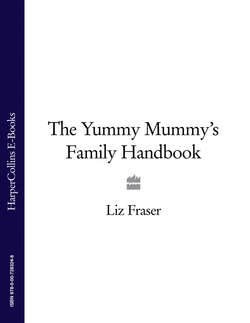Читать книгу The Yummy Mummy’s Family Handbook - Liz Fraser - Страница 60
Yuk! I’m Not Eating That! Dealing with fussy eaters
ОглавлениеIf parents could pick and choose the characteristics of their children (and if you are reading this any time after about the year 2020 then they probably can, so please forgive my antiquated musings) then Fussy Eater would lie somewhere near Bad Sleeper and Tantrum Thrower. Fussy Eaters are a nightmare, but almost every family has at least one and it can affect the way the entire family eats.
Before I go into how to a) prevent this from developing, and b) solve it once it’s set in, I should probably define my terms. By ‘Fussy Eater’ I do not mean a child who doesn’t like broccoli. That’s just ninety-nine per cent of children out there, and it’s nothing to worry about. Neither do I mean a child who hates every breakfast cereal you offer except for Sugar-Crunchy-Lard-Pops™. This child is very smart, and knows how to piss you off. He actually rather likes healthy Bran Flakes, but knows that refusing them makes you cross, so continues with his game.
No, a true Fussy Eater won’t eat at least fifty per cent of the food you offer him if it’s not exactly as he likes it.
Let’s take bread as a simple example. Surely he’ll eat one slice of a humble loaf of bread? Well, white’s OK, but not brown. Oh no, wait: some brown breads are OK, but not if they have those little seed thingies in them, and definitely no crusts. Righty-ho. Next up, vegetables. Peas: yes. Carrots: yes, but only if they are raw and cut into sticks. Slices are disgusting and will be hidden under a potato skin. Potatoes: baked, yes (but not the skin); boiled, never; roasted, yes (if cut into triangles, not slices). Broccoli: didn’t you read what it says above? NO broccoli. Courgettes: eeeeuugh! Are you trying to poison him? If he can’t pronounce it, he certainly won’t be eating it.
And so on. That’s a Fussy Eater. As you can imagine, living with one of these is tantamount to being in purgatory, because every time you think you’ve cracked what it is he does and doesn’t like, the blighter will change his mind and go off peas for the season. Oooh, you little…
So, how can you avoid finding yourself in such an unpleasant situation? Well, there are two methods—prevention and cure—and I strongly recommend the former. I know I said above that some kids are just born Fussy Eaters, and I stand by that having seen my second baby spit out anything with tomato in it from the age of four months unless it was precisely the same temperature as slightly-too-cold tea, but there is a lot you can do to stop this tendency from taking hold and giving you an ulcer:
Serve a large variety of foods from an early age. Kids who only ever eat sausages, peas and potatoes will find it very hard to move onto such delights as curry, pâté and bean sprouts later on. Keeping their palette stimulated and their diet very varied makes them much more adventurous in the food department.
Think about why your child is refusing the food. Is it because something in it tastes bad to her or she is allergic to it, or is she just testing the limits of your patience? If you think she really doesn’t like it—and not everybody likes the same tastes—then leave it out of her diet for a while and find an alternative. Then try re-introducing it a few weeks later when the aversion may have passed. If she is just mucking about (e.g. the slices versus sticks example above, or eating only certain kinds of yoghurt) then I have found that using a ‘don’t be ridiculous, it’s that or nothing’ approach can work, because they eventually get hungry and eat anything they can.
Give an incentive. The old ‘Mmmm, it’s really yummy!’ trick doesn’t work on any smart kid beyond the age of about three months. If a child thinks it’s disgusting, then it’s disgusting however much you smile as you eat it and rub your tummy with glee. If, however, you tell your F.E. that David Beckham loves drinking milk, then that could be the clincher.
Persist, persist, persist. If my kids have started refusing certain foods that they liked perfectly well before and therefore just seem to be making fuss about, I carry on serving it every day for a while. After a week or two they realise Mummy isn’t going to budge on this one, and get on with eating it again.
Rising to it: don’t. The less you react, the less successful their mission to irritate you or make a point is turning out, and the faster they will stop. If you pretend that it’s neither here nor there whether they eat their potatoes, they will often finish them while you’re not looking.
Talk about it. If none of this is working, then have a chat about why they don’t like so many foods. It could be something completely different, like being worried in case they drop spaghetti or peas down their front, or that the seeds in bread hurt their teeth (in which case a trip to the dentist is in order) or something they’ve read or heard somewhere else.
Serve smaller portions. There’s no point putting a mountain of mashed potato in front of a child who you know hates the stuff. Giving just a few spoonfuls is much better, as they are more likely to manage that amount and feel happy. Once you’ve cracked such a small helping you can start to increase it gradually.
Get them to suggest something else. I don’t mean this as a ‘Well, you come up with something better then!’ retort, but sometimes children can suggest all sorts of alternatives you hadn’t thought of:
